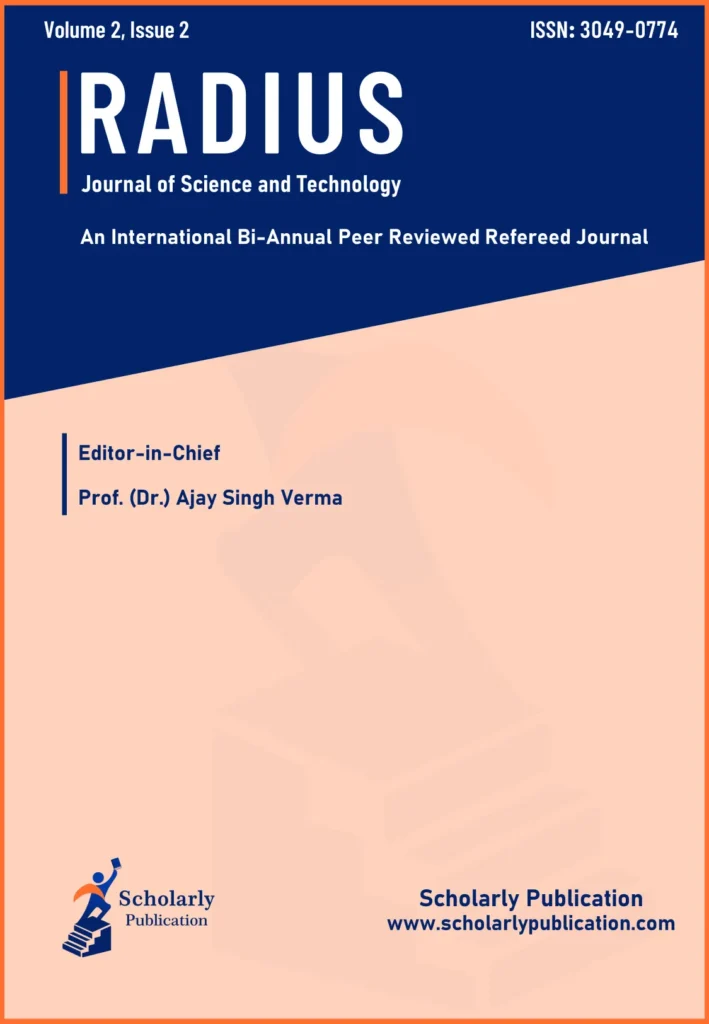Electric Vehicles: A Sustainable Solution for Urban Transportation
Volume 2, Issue 2, Article Number: 252001 (2025)
Home >> Radius >> Volume 2, Issue 2
1Department of Electrical Engineering, School of Engineering & Technology, Shri Venkateshwara University, Gajraula, Uttar Pradesh (India)
*Corresponding Author: asifchoudhary410@gmail.com
Received: 10 June 2025 | Revised: 26 June 2025
Accepted: 30 June 2025 | Published Online: 03 July 2025
DOI: https://doi.org/10.5281/zenodo.15799104
© 2025 The Authors, under a Creative Commons license, Published by Scholarly Publication
Abstract
Urban areas face growing challenges from traffic congestion and vehicular emissions. This study investigates the potential of electric vehicles (EVs) as a transformative solution for sustainable urban mobility. Using life cycle assessment (LCA), net present value (NPV) analysis, and traffic simulation via PTV VISSIM, we quantify the environmental, economic, and operational benefits of EVs compared to internal combustion engine (ICE) vehicles. Results show EVs can reduce lifecycle CO2 emissions by a quantified 61% and energy consumption by 58%. Smart grid integration further enhances their potential by enabling off-peak charging and vehicle-to-grid (V2G) support.
Keywords
Electric Vehicles, Urban Transportation, Sustainability, Green Mobility, Energy Efficiency, Carbon Emissions, Smart Grid, Cost Analysis
References
- Mavlutova, I., Atstaja, D., Grasis, J., Kuzmina, J., Uvarova, I., & Roga, D. (2023). Urban transportation concept and sustainable urban mobility in smart cities: A review. Energies, 16, 3585.
[View Article] [Google Scholar]
- Casella, V., Fernandez Valderrama, D., Ferro, G., Minciardi, R., Paolucci, M., Parodi, L., & Robba, M. (2022). Towards the integration of sustainable transportation and smart grids: A review on electric vehicles’ management. Energies, 15, 4020.
[View Article] [Google Scholar]
- Singh, A. P., Sharma, K., Rengarajan, A., & Gautam, A. K. (2024). Promoting Sustainable Transportation Solutions Through Electric Vehicles in Smart Cities. In E3S Web of Conferences, 540, 02021, EDP Sciences.
[View Article] [Google Scholar]
- Alanazi, F. (2023). Electric vehicles: Benefits, challenges, and potential solutions for widespread adaptation. Applied Sciences, 13, 6016.
[View Article] [Google Scholar]
- Dlugosch, O., Brandt, T., & Neumann, D. (2022). Combining analytics and simulation methods to assess the impact of shared, autonomous electric vehicles on sustainable urban mobility. Information & Management, 59, 103285.
[View Article] [Google Scholar]
- Turoń, K. (2020). Hydrogen-powered vehicles in urban transport systems–current state and development. Transportation Research Procedia, 45, 835-841.
[View Article] [Google Scholar]
- Karoń, G. (2022). Energy in smart urban transportation with systemic use of electric vehicles. Energies, 15, 5751.
[View Article] [Google Scholar]
- Hamurcu, M., & Eren, T. (2020). Electric bus selection with multicriteria decision analysis for green transportation. Sustainability, 12, 2777.
[View Article] [Google Scholar]
- Cao, J., Chen, X., Qiu, R., & Hou, S. (2021). Electric vehicle industry sustainable development with a stakeholder engagement system. Technology in Society, 67, 101771.
[View Article] [Google Scholar]
- Hamurcu, M., & Eren, T. (2022). Applications of the MOORA and TOPSIS methods for decision of electric vehicles in public transportation technology. Transport, 37, 251-263.
[View Article] [Google Scholar]
- Manzolli, J. A., Trovao, J. P., & Antunes, C. H. (2022). A review of electric bus vehicles research topics–Methods and trends. Renewable and Sustainable Energy Reviews, 159, 112211.
[View Article] [Google Scholar]
- Ehrler, V. C., Schöder, D., & Seidel, S. (2021). Challenges and perspectives for the use of electric vehicles for last mile logistics of grocery e-commerce–Findings from case studies in Germany. Research in Transportation Economics, 87, 100757.
[View Article] [Google Scholar]
- Xiong, R., Kim, J., Shen, W., Lv, C., Li, H., Zhu, X., … & Sun, F. (2022). Key technologies for electric vehicles. Green Energy and Intelligent Transportation, 1, 100041.
[View Article] [Google Scholar]
- Kilari, S. D. (2021). Comprehensive lifecycle analysis of electric vehicles: Environmental impact versus traditional vehicles. Available at SSRN 5207178.
- Nawaz, M. U., Qureshi, M. S., & Umar, S. (2024). Integration of solar energy systems with electric vehicle charging infrastructure: challenges and opportunity. Revista Espanola de Documentacion Cientifica, 18, 1-18.
- Sakamoto, K., & Kobayashi, Y. (2023, May). Development of Active Noise Control System Optimized for Road Noise Reduction. In INTER-NOISE and NOISE-CON Congress and Conference Proceedings, 266, 692-700. Institute of Noise Control Engineering.
Cite This Article
A. Asif and L. Kumar, “Electric Vehicles: A Sustainable Solution for Urban Transportation,” Radius: Journal of Science and Technology 2(2) (2025) 252001. https://doi.org/10.5281/zenodo.15799104
Rights & Permission
This is an open access article published under the Creative Commons Attribution (CC BY) International License, which allows unrestricted use, distribution, and reproduction in any medium, provided the original work is properly cited. No permission is needed to reuse this content under the terms of the license.
For uses not covered above, please contact the Scholarly Publication Rights Department.

